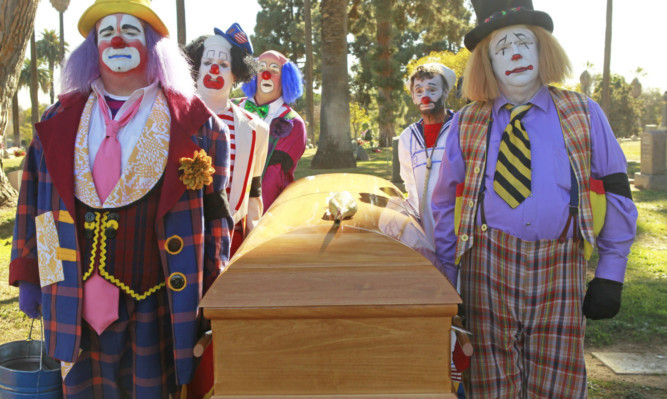
TRAINSPOTTING author Irvine Welsh believes he’s hit upon one of life’s great truisms Scots have a better time at funerals than weddings.
The author claims stressed families often turn a couple’s nuptials into a nightmare while people try to cheer each other up when someone passes away.
With the average wedding now costing in excess of £20,000, it’s easy to see why they have become fraught showcase affairs.
But with funerals, at least where they concern someone who’s enjoyed a good innings, many agree with the author that they offer a far more enjoyable and boozy experience.
“We find a lot of laughter in the dark in Scotland,” said the 56-year-old writer.
“The best laughs in Scotland are at somebody’s funeral. Everyone is telling jokes and laughing and all that and the most miserable time is at a wedding.
“They are supposed to be a celebration but everybody is squabbling and arguing.”
Welsh has made a hugely successful career out of his observations of life in Scotland but does his take on this topic strike a chord with people or is he alone in his views?
Many think he’s on to something. Funerals offer a chance to catch up with fun, seldom-seen relatives. There’s rarely loud music.
Eulogies flow more freely than formal speeches. People love belting out Abide With Me.
The drink often flows freely after the most trying and difficult part of the day is dealt with. Weddings, on the other hand, with their formal structure, showing off, present lists and relentless photo-sessions are less likely to arouse the natural Scots fondness for all things dour.
Psychologist Professor Cary Cooper, of Lancaster University, said the huge expectations surrounding weddings made them stressful.
“Weddings are very tense things,” he said. “The family don’t want anything to go wrong.
“Weddings are pressure for everyone in the family. You can see how people fall out.
“At a funeral you are going to celebrate someone’s life. There isn’t the same pressure of expectation that you get at a wedding.
“The Scots know how to overcome the dark times. I don’t think other countries know how to do that as well.
“Scotland has gone through difficult times in its history. I think when that happens you learn a coping strategy.
“I think Scotland has a national coping strategy in trying to see its humorous side but acknowledging the serious side of it.
“The English are more serious and less likely to crack jokes at a funeral.
“The Irish wake is a party so maybe it’s a Celtic thing.
“Cracking jokes and having fun is a way of coping with loss. However, it becomes more difficult to do that when someone is young you can’t joke about a young life going.”
Church of England priest Dr Giles Fraser has raised concerns that too many modern weddings have “lost their way”.
The churchman said the idea of self-sacrifice was lost when the ceremony was “specifically designed to be all about me and about being a princess for a day”.
“Most clergy I know prefer taking funerals to taking weddings,” he said, as they have a dignity and moral seriousness that is “quite absent from many of the weddings that we get to take”.
Maudlin behaviour is rooted in the Scots psyche. It stretches from the time of William Wallace and England’s oppression of the Scots, to the Highland Clearances, a talent drive of ex-pats to foreign shores, right up to the modern-day angst over the national side’s chances of qualifying for a major football tournament.
Given free rein at a mass outpouring of grief and love, it’s no wonder it reaches poetic levels of grandeur.
Comic legend Billy Connolly, 72, is such a big fan of funerals he made a documentary about them, listing his favourites and talking about plans he has for his own.
“Dying is easy,” he has said. “You just lie down. But staying alive is quite difficult you have to stay interested and in touch with everything.”
Even the Bible agrees that funerals are better.
In Ecclesiastes 7:2, it says: “It is better to go to the house of mourning than to go to the house of feasting, for this is the end of all mankind and the living will lay it to heart.”

Enjoy the convenience of having The Sunday Post delivered as a digital ePaper straight to your smartphone, tablet or computer.
Subscribe for only £5.49 a month and enjoy all the benefits of the printed paper as a digital replica.
Subscribe